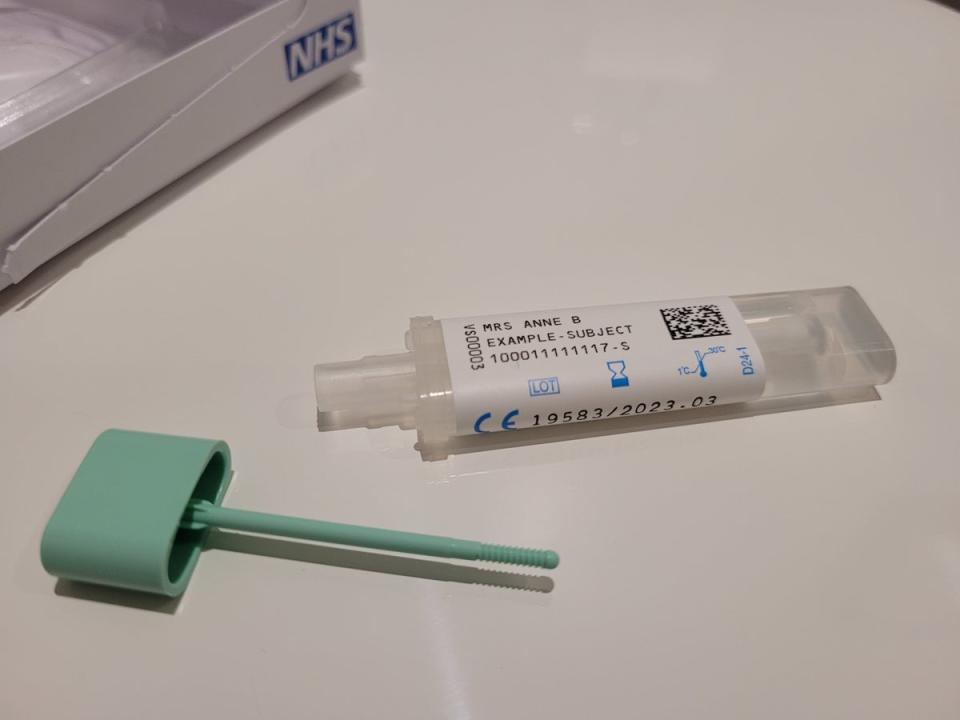What is bowel cancer? Everything you need to know about Bowel Cancer Awareness Month

Bowel Cancer Awareness Month aims to raise awareness and fund more support for cancer research every April.
Around 43,000 people are diagnosed with bowel cancer in the UK annually and a further 16,000 die from the disease.
However, early detection can help people survive it, so people need to know its signs and symptoms.
One goal of Bowel Cancer Awareness Month is to help people better understand these while highlighting how people live with cancer.
The initiative is crucial as it can help fund and facilitate better research into bowel cancer.
There have already been some breakthroughs in research into bowel cancer, with scientists hoping for more in the future.
Earlier this year, a study showed that patients may no longer need a biopsy for diagnosis.

In March, the Cancer Research UK Scotland Institute and the University of Glasgow found that imaging technology known as positron emission tomography (PET) can allow the entire bowel to be examined and tumours to be studied inside the body. This is instead of examining the tissue once it has been removed.
The scans create three-dimensional pictures of the inside of the body and, combined with frequent tests, can help monitor the disease better.
Here’s everything you need to know about bowel cancer and Bowel Cancer Awareness Month.
What is bowel cancer?
The bowel is split into two parts: the small bowel and the large bowel.
The large bowel includes the colon, the rectum, and the bowel opening (anus). When cells in these parts of the body grow and reproduce uncontrollably, invading and destroying healthy tissue, bowel cancer is diagnosed.

Fight CRC, a colorectal cancer advocacy organisation raising awareness of the disease, says about 90 per cent of bowel cancer cases have occurred in people aged over 50 since the mid-1990s.
However, the new cases have sharply risen among adults under 50.
How common is bowel cancer in the UK?
The disease is the second-most deadly form of cancer in the UK after lung cancer.
Bowel Cancer UK says one in 15 men and one in 18 women will develop the condition at some point. It says about 268,000 people are living with the disease.
Bowel Cancer UK reported that two in five people couldn’t name a single bowel cancer symptom. However, the NHS has said that a record number of people in England are having bowel cancer checks following the death of Deborah James, the former Radio 5 presenter, in 2022. She raised millions for cancer charities after being diagnosed with the illness.
How to mark Bowel Cancer Awareness Month
There are many ways to support Bowel Cancer Awareness Month, from sharing information on social media to donating to leading cancer organisations.
The first step in supporting bowel cancer awareness is to familiarise yourself with the illness and understand how you can help family and loved ones recognise signs of cancer. Macmillan has shared a helpful guide that includes everything you need about bowel cancer.
Bowel Cancer UK has also shared a tool kit telling people how to share graphics and videos that provide further information.
DIY testing
In 2023, the NHS introduced DIY testing kits for bowel cancer, inviting more than 800,000 people in England to undertake DIY checks. NHS England said all adults over 54 have been sent at-home screening kits in a phased project expansion scheme,
The aim is that expanding the screening to include younger adults not normally included will help improve bowel cancer detection when it is at an earlier stage — and save thousands of lives.

The Faecal Immunochemical Test (FIT) is conducted at home. People put a small faecal sample in a tube and send it in the post to a laboratory where it is tested for microscopic amounts of blood. Results are then returned to participants with information about further tests if needed.
Only two out of 100 people using the kit currently need further testing.
Bowel cancer is the fourth most common cancer in the UK and the second-biggest cancer killer.
Here is what we know about the condition, its symptoms, and how to check if you have it.
What are the symptoms of bowel cancer?
The NHS says that more than 90 per cent of people with bowel cancer have one of the following combinations of symptoms:
a persistent change in bowel habit — pooing more often, with looser, runnier poos, and sometimes stomach (abdominal) pain.
blood in the poo without other symptoms of piles (haemorrhoids).
abdominal pain, discomfort or bloating — always brought on by eating.
Biggest symptom of bowel cancer not to ignore
A recent study published in BMC Primary Care involved 511 cancer cases among 61,802 patients.
The study found rectal bleeding, also known as haematochezia, was the most common symptom. This had a specific rating of 99.4 per cent, meaning it is the most reliable indicator of bowel cancer.
Bowel cancer can in some cases cause bowel obstruction, which is when digestive waste can’t pass through the bowel. Symptoms of bowel obstruction include the following:
intermittent, and occasionally severe, abdominal pain always brought on by eating.
unintentional weight loss with persistent abdominal pain.
constant swelling of the tummy with abdominal pain.
being sick with constant abdominal swelling.
When should I see a GP?
The NHS advises people to seek medical advice if they have any symptoms for three weeks or more.
“Make sure you see a GP if your symptoms persist or keep coming back after stopping treatment, regardless of their severity or your age. You’ll probably be referred to hospital,” it adds.
A plant-based diet has been found to help reduce a person’s risk of developing bowel cancer.
What are the risks and causes of bowel cancer?
The risk of developing bowel cancer depends on several factors, including age, genetics, and lifestyle.
Cancer Research UK says consuming excessive red and processed meat or too little fibre can increase the risk. Being overweight or obese, smoking, and drinking alcohol are also risk factors.
Family history can also affect the likelihood of developing bowel cancer. Cancer Research UK says: “Your risk of bowel cancer is increased if you have a first-degree relative (parent, sibling, child) diagnosed with bowel cancer.”
Some medical conditions, including bowel conditions, can also increase your risk.
For more information, visit Cancer Research UK and the NHS website.

 Yahoo Lifestyle
Yahoo Lifestyle 